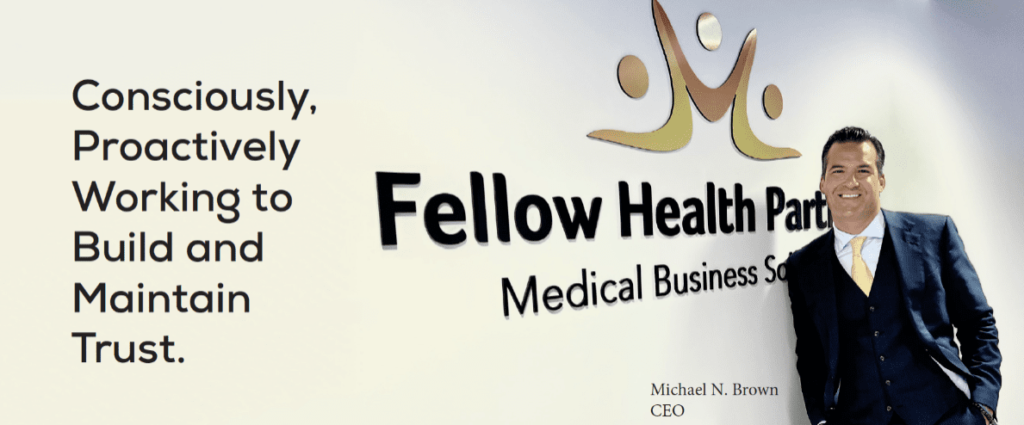
Trust and the Healthcare System

“Our $4.5 trillion medical system is built on trust. Patients trust doctors and nurses to heal them. Doctors trust insurance companies to get paid. Hospitals, surgery centers, physicians, and ancillary services are all connected by a bond of trust.” Michael N. Brown, CEO of Fellow Health Partners, is speaking about the most important factor in the healthcare system – trust.
“Most people might not be aware that the glue holding all this trust together is the often-overlooked business of medical billing and its associated infrastructure.”
When billing works properly, trust grows among medical providers and patients. When it doesn’t, trust erodes.
“As one of the fastest growing medical billing companies, we take trust seriously because we are responsible for getting the billing right for our clients and their patients. In our experience, as soon as money is involved, it’s a real pressure test on trust.”
Despite all the trust in the system, it doesn’t always work the way it should. Sometimes it’s because of mistakes, sometimes because of misunderstanding, but mostly due to the complexities and regulations in place. Michael says, “Trust in the medical system has been falling for decades so that in 2019, only 15% of Americans reported a ‘great deal of confidence’ in the U.S. Medical system. The good news is that 85% of patients still have a high level of trust in doctors and nurses but only 33% trust insurance companies. One of the reasons they don’t trust them is because of problems in medical billing. This was one of the reasons for the founding of Fellow Health Partners.”
It appears that even though the medical billing system functions, there are lots of errors, miscommunications, constantly changing payment rules, and a series of rising costs that affect patients and providers alike. It was because of his desire to understand and smooth out these imperfections that Michael was attracted to the medical billing industry.
The Need
After a career in business consulting, working with large multi-national companies across many industries, he was drawn to the medical billing industry because of the opportunities to provide a better product and service at a fair price. He researched the field and found that it was changing very fast as growth and consolidation swept through healthcare. Billing was becoming more impersonal, driven by the large “offshore” companies that focused on technology and cost savings at the expense of customer service. They offered lower costs than the traditional “mom-and-pop” billers who couldn’t scale to meet the demands of larger, consolidating entities such as hospitals and physician groups. Even though they provided personal services for medical providers and their patients, these “mom-and-pop” companies couldn’t keep up.
As Michael analyzed the market, he concluded that trying to “fix” the problems weren’t the answer. Too many things were already broken. The mom-and-pop billers had never set out to build scalable, technology-assisted services. The large, impersonal offshore companies were built to provide unrealistically low rates, not to collect every dollar, which meant a lot of money went uncollected. So, instead of fixing a broken machine, he decided to build a new one.
“As one of the fastest growing medical billing companies, we take trust seriously because we are responsible for getting the billing right for our clients and their patients.”
The Solution
Michael says, “It was clear that consolidation was going to continue, which meant that an effective billing company was going to have to combine efficiency, scalability, and customer service at a reasonable cost – to provide the value that larger medical groups, surgery centers, and systems were looking for.”
He further added, “We focused on training, technology, and talent – the three most important factors in building an efficient, high-performance, trustworthy billing operation. The training was critical because insurance rules changed all the time, technologies were evolving, and we had to connect new systems with our platform as consolidation created larger entities. We also introduced ongoing training in ‘people skills’ as customer service became more important for both patients and medical providers. They wanted a ‘high touch’ experience that would generate higher levels of customization that they could trust.”
When it came to technology, trust was also important. It had to provide data security, efficiency, transparency, and customization for an increasingly demanding clientele. That’s why Fellow Health Partners built their own internal resources versus using 3rd party vendors, which is how the vast majority of the industry operates. This rapidly growing division is under the direction of Ali Raza, Senior Systems Architect. It is responsible for security, development, and integration with our client’s technology. Ali says, “We build trust with clients by meeting their needs and innovating. They have a growing need for specialized customization, collection efficiencies, and real-time communication regarding billing. They want happy patients, so it’s critical that our customer service team has access to the most up-to-date, thorough billing information that lets them answer patients’ questions accurately and clearly. That’s why we continue to evolve our custom-built SAVi™ software that allows our billers as well as our clients to access their accounts 24/7. It is completely transparent. Nothing is hidden. They can see what they want right away, in real-time, instead of waiting days or even weeks for information and reports.”
Customization, defined processes, and transparency make our clients more comfortable with us, and since trust is a result of comfort over time, this comfort with customization leads to more trust. Trust is such an important part of the relationship between a medical billing company and its providers that it is included as a core part of the curriculum at Knowledge College™, the in-house training facility at Fellow Health Partners. Michael Brown says, “Our success isn’t just based on technology and systems. It’s also a result of our focus on attracting, training, and retaining great talent. Even though some repetitive aspects of the billing process can be automated, there is nothing that can replace a skilled biller or coder who must deal with the more complicated aspects of medical billing.“
“On the customer service side, patients are becoming more demanding because they are paying higher copays and deductibles now more than ever. We have noticed that patients have moved beyond just being customers of health care. They have become paying consumers of health care, who are more demanding about customer service. That’s why there isn’t a day when our Knowledge College™ isn’t being used to keep our talent up to date on how to satisfy these consumers.”
How Trust is Built and Maintained
Michael says, “Knowledge College™ teaches our teams that a low-tension relationship is a key to the comfort that helps build and maintain trust. One step towards building this comfort is to behave appropriately and to be conscious of what not to do – what might be inappropriate. In our case, appropriate behavior includes transparency and honesty, among other things. It even includes persistence when appropriate. For example, we chase denials very aggressively and have been told by auditors that we have one of the highest collection rates they have ever seen. For us, this persistence is appropriate. Our clients expect it, and we work hard to deliver.”
“We don’t ask people to trust us. We earn their trust, one step at a time. I often explain to new clients that providing the best possible service at the lowest cost is a selfish endeavor. We simply want to please our clients so much that they want to refer others to our service, which grows our client base, and we can set our internal expectations even higher. We enjoy stretching to meet that challenge. Fellow Health Partners continues to earn the trust of doctors, patients, and medical administrators, because of their ongoing commitment to serving the financial and ‘people’ needs of their clients,” concludes Mr. Brown.